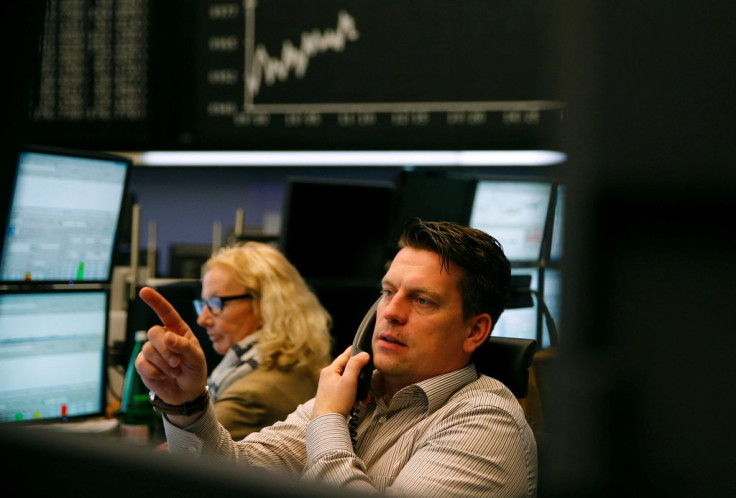Europe market turmoil: FTSE turns red as China panic takes hold

European equity markets declined on 7 January, taking their cue from their global counterparts amid concerns the slowdown in the Chinese economy could be worse than anticipated. Trading in China was halted for the second time this week after the circuit breakers of the Shanghai Composite Index were triggered 29 minutes in the session, as the index tumbled over 7%.
Stocks with large exposure to the world's second-largest economy such as miners and energy companies fell sharply, hitting their lowest level since 2009, while car makers were also firmly on the back foot and fell to a three-month low.
In London, where the FTSE 100 was down nearly 3% and well below the 6,000 benchmark, energy and mining stocks plunged to an 11-year low as crude and metal prices tumbled as worries the slowdown in the Chinese economy could be more serious than initially expected.
The FTSE 350 Mining and Oil and Gas indexes all fell over 4%, while Anglo American, Glencore, BHP Billiton, BG Group and Royal Dutch Shell were all firmly in the red.
Retailers were also on the back foot, with Poundland slumping 10%, while Next, Morrisons and Tesco all fell. Marks and Spencer, however, bucked the trend and gained ground despite a weak set of third quarter results as chief executive Marc Bolland announced he will leave the company in April.
Elsewhere, the Pan-European Stoxx 600 index recorded its biggest slide since August as it declined as much as 3.6% during morning trade, while Germany's Dax fell below the 10,000 threshold for the first time since October.
The German benchmark has plunged 14% since its November 2015 high and has lost 8.5% so far in January, putting it on track to post its worst weekly loss since August 2011, while the Stoxx 600 has fallen 6.3% in the first four trading days of 2016.
"Asian markets gave up more ground overnight following continued PBoC devaluation of the yuan currency, bolstering jitters about the world's number two economy," said Michael van Dulken, head of research at Accendo Markets.
"This followed a weak US close after US Fed minutes suggested some apprehension among Federal Open Markets Committee members about rate rises in the face of deflationary pressures in the world's largest economy."
A disappointing reading on retail sales did little to lift the mood among investors after figures released by Eurostat showed sales in the eurozone grew at their slowest pace in a year in November 2015.
On a working-day adjusted basis, retail sales rose 1.4% year-on-year compared with a downwardly revised 2.4% advance in the previous month and short of analysts' expectations for a 2% gain. On a monthly basis, meanwhile, retail sales fell 0.3% extending October's 0.2% drop and failing to deliver the expected 0.2% increase.
But there was better news on the employment front, as the unemployment rate in the 19-country bloc reached its lowest level in over four years in November 2015.
The jobless rate fell to 10.5% of the workforce in November last year compared with a 10.6% reading in October, marking its third consecutive monthly decline.
"The headline data have been revised more than usual recently, and we can't rule out next month's report will be less optimistic, but the overall picture is one of a slowly improving labour market in the euro area," said Claus Vistesen, chief eurozone economist at Pantheon Macroeconomics. "This is consistent with unemployment falling with a lag to stronger GDP growth, and we think the trend will continue this year.
Meanwhile, the European Commission's economic sentiment indicator for the eurozone unexpectedly rose to 106.8 in December from 106.1 in November.
© Copyright IBTimes 2025. All rights reserved.


















